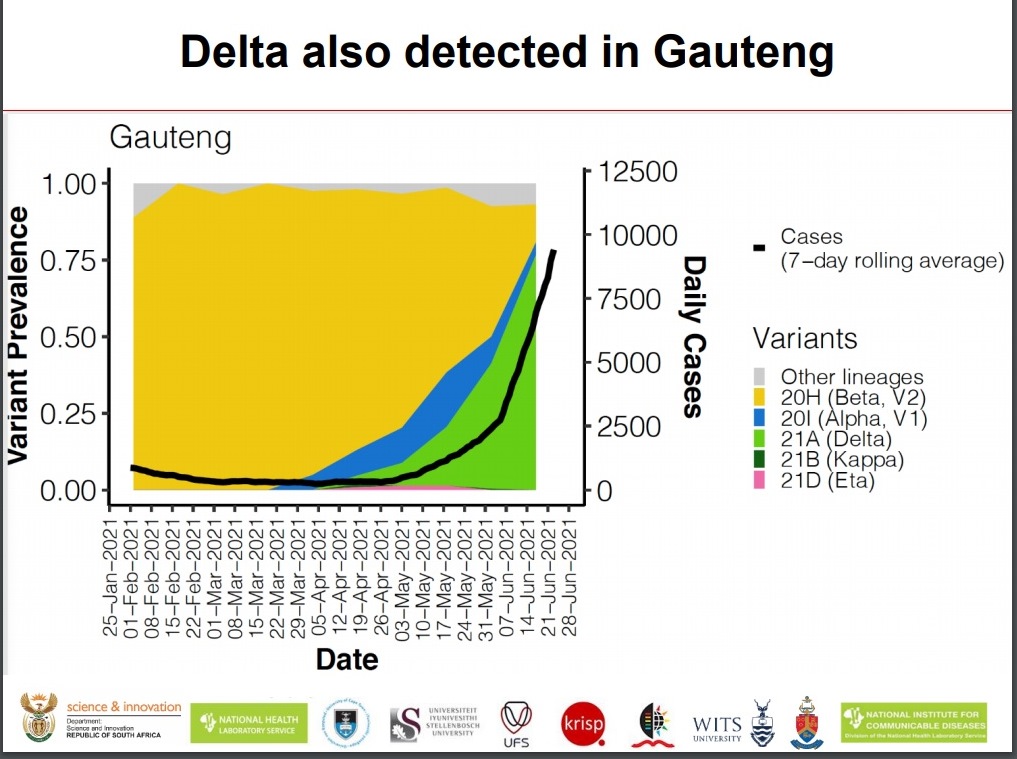WESTERN CAPE NEWS - The Western Cape is revising its preparations for a worse Covid-19 third wave than initially predicted.
This is as a result of the Delta variant which has rapidly become the dominant variant in the latest infections in the province. It is also present in the Garden Route.
Its appearance in new infections rose from 8% last week to about 50%, according to the latest genome sequencing data (up till yesterday, 30 June) from National Genomic Surveillance SA (NGS-SA).
The information was shared yesterday morning, Thursday 1 July, by public health specialist Prof Mary-Ann Davies, during the weekly digital conference hosted by Premier Alan Winde.
Similar to what happened in September and October last year when the Beta variant rapidly took over all other lineages, the Delta variant has taken over from May to June, in some areas even faster than the Beta variant did. From available data, this is similar for Gauteng, Eastern Cape, KwaZulu-Natal and Limpopo.
Davies said the South African Coronavirus Modelling Consortium (SACMC) has declared its projections for the third wave, done in April, not applicable anymore and is updating its predictions. These are hoped to be available next week.
SACMC's prediction of a less severe third wave was based on the Beta variant's behaviour. However, actual hospital admissions in all the large provinces are exceeding projections for a third wave. It is only in Gauteng that the actual admissions have not yet reached the predicted levels, because a much worse third wave had been predicted for that province.
"We are planning for a third wave that could be as severe as the second, but with capacity to scale up further," said Davies.
Sharp rise in infection rate expected over the next week
SACMC's youngest short-term prediction (a week ahead) is that the infection rate in the Western Cape will increase sharply to over 3 500 new cases per day, compared with just under 2 000 cases per day currently.
Admissions are predicted to increase from the current 240 per day to about 500 per day by the middle of next week.
 The genome sequencing data show that the Delta variant's increase now closely matches newly reported cases. The black line represents new cases and the green area the Delta infections.
The genome sequencing data show that the Delta variant's increase now closely matches newly reported cases. The black line represents new cases and the green area the Delta infections.
Isolate if you have 'sniffles'
Davies said emerging evidence shows that the symptom profile of the Delta variant is different from other variants. Instead of severe fever and loss of smell and taste that were very prominent in the second wave, it is now much more like a normal cold - headache, sore throat and runny nose. She urged people who experience flu-like symptoms to immediately isolate themselves, even if they don't test.
At the moment, there is no evidence of vaccine escape by the Delta variant - vaccines provide high levels of protection against severe disease.
Vaccines' impact on healthcare workers' health
Head of Health Dr Keith Cloete said 212 out of 22 970 vaccinated healthcare workers in the province have been infected, of whom 10 were hospitalised. Only one needed to be admitted to the ICU and there have been no deaths. He said this is a positive indication of the effectiveness of vaccination. "We are tracking this very closely, especially with the increase in the Delta variant."
Vaccination has been scaled up over the past six weeks with available vaccines, and the province has the capacity to scale up rapidly as more vaccines are received.
Cloete said the province's outbreak response is now shifting focus to protecting high-risk Covid-19 patients and as a result, testing criteria have changed and will focus on those who are the most vulnerable.
3rd wave like a déjà vu
Winde said the third wave is like déjà vu, but just with another variant. He said the province is ready for the third wave based on its experience from the first and second waves.
'We bring you the latest Garden Route, Hessequa, Karoo news'
















